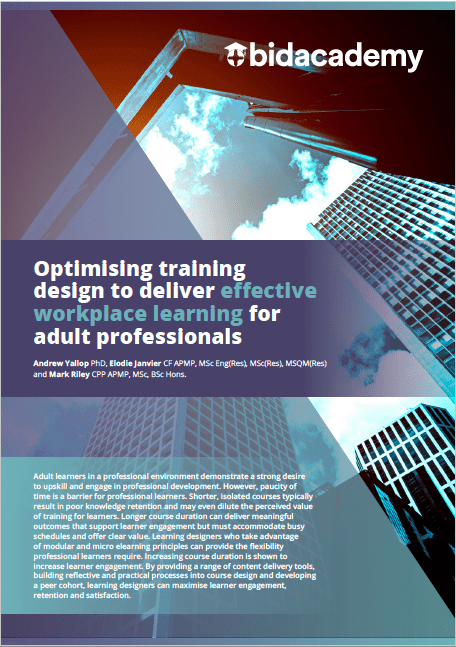By Mark Riley, CPP APMP, General Manager Bid Academy
In today’s heated employment market more employers than ever recognise the benefit of training as a means to retain existing staff, as opposed to going through the difficult and risky process of hiring new talent, see Figure 1.

Figure 1 - Train rather than hire.
According to Deloitte's recent survey, organisations are choosing to invest more in training their staff rather than hiring new personnel.
And with a greater range of employment options, potential employees are also favouring organisations that are prepared to invest in the personal and professional development of staff through training and on the job learning.
Defining what good tender training looks like
With employers and employees driving the explosive demand for professional learning and development – and with so many training options now available in the bid response space, it’s worth taking a step back to explore what good tender training looks like.
Most will agree that employers and employees share a common goal: to get the best learning outcomes from their investment, with the least possible impact on personal and professional lives.
But context is crucial. Having delivered over 250 specialised tender training workshops and events to over 4000 participants, we’ve seen three recent patterns emerge:
- COVID-19 has accelerated a shift away from face-to-face training towards online learning – a trend that looks here to stay.
- Time-poor professionals are finding it difficult to take days, or even half days, out of their businesses to attend conventional training courses.
- Learners are increasingly focused on selecting training that makes an instant and palpable difference – favouring courses that teach practical techniques they can apply immediately over easily forgotten theoretical content.
Although our goal has always been to provide practical techniques, tips and tricks that participants can take away and use in their real world, we suspect that the percentage of content that remains with participants once a conventional training event is complete is quite low. We’d posit a figure as low as 5 -10%, with this diminishing even further if the newly gained skills are not ingrained and applied from day one.
With these seismic shifts in the workplace and potential issues with the long-term effectiveness of conventional training, we felt our next generation of training courses needed to be different.
Testing our theories against the literature
To test our thinking, we asked our very own Elodie Janvier and Andrew Yallop to examine the literature on the latest trends in adult professional learning. As a result, we’ve published an insightful white paper on the topic. You can download it below.
Bid Academy White Paper
Optimising training design to deliver effective workplace learning for adult professionals
Andrew Yallop CF APMP, PhD, Elodie Janvier CF APMP, MSc Eng(Res), MSc(Res), MSQM(Res) and Mark Riley CPP APMP, MSc, BSc Hons.
The central themes of this white paper inform Bid Academy’s training philosophy as we create and deliver better learning experiences for the tender response training market.
As a sneak peek at what we uncovered, here are five things to keep front of mind when selecting your next tender training program – be that for yourself, or your staff:
1. Longer course durations deliver comprehensive and recognised outcomes
Research indicates short course lengths can negatively affect participation, especially in cases where learners perceive insufficient professional or financial benefits as a result. By comparison, longer course durations are more closely associated with quantifiable outcomes and professional industry recognition. Ultimately, learner concerns about course duration come second to their preference for programs with industry credibility and sustained professional outcomes.
2. Bite-sized modular learning provides flexibility and retention
The skills needed to master the art and science of winning tenders are diverse and complex, and on the face of it can seem overwhelming. But deconstructing the most important skills into a logical sequence of micro-learning steps allows hyper-focused bursts of learning and the autonomy participants need to build lasting knowledge.
3. Learning within a community of peers enables shared understanding
Even within a self-paced, flexible training program, learning is markedly less effective for solo learners. In contrast, learning as part of a group enables interactions with peers, shared reflection and interpersonal development. This results in a more enjoyable collegial experience and a deeper understanding of the topic.
4. Interactions with experts provides a valued personal touch
As the availability of online courses has expanded, so has the growth of individual, unguided learning. However, research shows that learning improves in small groups of less than 30 people, with live access to industry-expert coaches. These live sessions allow learners to test their comprehension of the topic and individually apply the learning to their real world – an essential step in a richer, more sustained learning experience.
5. Embedded flexibility facilitates learning when and where you want it
A key challenge in delivering effective training to busy adult professionals is their lack of time. They need to fit learning around professional, family and social commitments. Combining a modular approach with the increased accessibility offered by online delivery channels gives learners the flexibility to engage with the learning material on their terms.
Not all training programs are created equal
This research demonstrates that Bid Academy has effectively ‘read the room’ when it comes to aligning the design of its latest programs to evolving learner needs.
The adult training space moves with lightning pace and with the proliferation of training options available it would be very easy to confuse style with substance. So, before investing in the next tender training program for you or your bidding team, I’d encourage you to use these five findings as a checklist to ensure you maximise learning outcomes and knowledge retention.
Who knows, you might even find that our very own Bid Accelerator program is just what you’re looking for!





